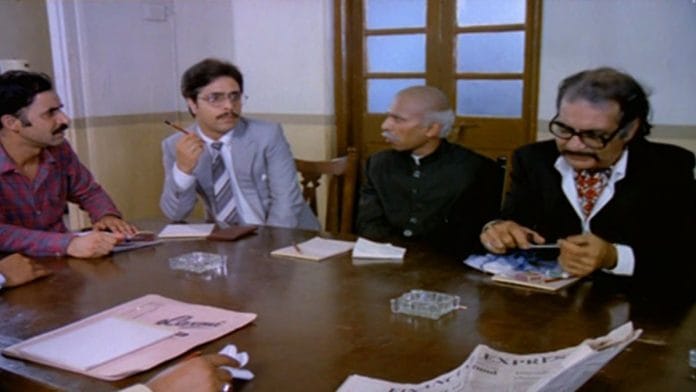Ek Ruka Hua Faisla is everything a Bollywood movie is not. There is no hero versus villain melodrama, or couples chasing each other around trees. Instead, the camera is trained on the 12 jurors tasked with deciding the fate of a 19-year-old boy who has been accused of murdering his father.
Basu Chatterjee’s 1986 remake of Sidney Lumet’s 12 Angry Men (1957) is constrained by Bollywood standards. It relies on the actors to take the story forward. When it begins, all the jurors are convinced of the teenager’s crime. They are eager to quickly deliver a guilty verdict and get on with their lives. Except for juror number 8, played by KK Raina.
The 12 jurors need to come to a consensus and deliver one verdict. What follows in that bare room as they deliberate over the teenager’s guilt is a masterclass in tension and emotions.
And while decades have passed since the movie’s release, it hasn’t quite left public memory. There’s talk of director Darshan Ashwin Trivedi remaking the legal drama
“But the important thing is to see whether they are able to do justice with the soul of the story. It’s not that only we could do it and others can’t. Others can also do. Maybe they can even do better than us,” said Raina in an interview.
The jury trap
Lumet’s movie and the eponymous play it was based on is set in the United States of America during the McCarthy era. Chatterjee’s film shifts the narrative to a middle-class Indian setting.
It’s a simple plot with a complex execution. It unfolds within the confines of a single room, a setting that contributes to the intense psychological dynamics between the characters. The director uses the claustrophobic space of the jury room to build on the suffocating tension. Tight framing and careful positioning of the camera drive this home.
None of the jurors are allowed to leave the room until they agree on one verdict.
There’s tension as the jurors’ personalities and priorities clash. Each of them is quick to declare the young man guilty for different and personal reasons. One has to catch a film in the theatre. Another harbors resentment based on the child’s caste, and another sees the trial as a means of avenging the wrongs his own son has inflicted upon him.
How Chatterjee or rather Lumet — considering Ek Ruka Hua Faisla is a scene-by-scene adaptation of 12 Angry Men — explores human psychology and social issues that make the film so compelling.
Contrary to typical Hindi films, his decision to use minimal background music further adds to the film’s realistic feel.
The music score is subtle but it reaches a crescendo toward the end when juror 3 (played by Pankaj Kapur) has a breakdown, recalling how his son left him two years ago.
The raw emotions and the dramatic background music go hand in hand.
Also read: 1 night, many crooks, & Madhubala’s comedy—Gateway of India isn’t a regular Bollywood masala
12 angry men
Broadway actor Lee J. Cobb plays juror 3 in 12 Angry Men. He is both reflective and resolute in his beliefs. But, Kapur’s portrayal is further layered by his physical mannerisms.
There’s a slight slouch when he sits. What stands out is the distinct way he delivers his lines: his speech is slightly halting, with his tongue occasionally sticking out after each sentence. This speech quirk hints at a nervous energy, possibly indicating an internal struggle or vulnerability, making his performance all the more authentic and captivating.
Another performance that truly stood out was that of Annu Kapoor as the elderly juror. Despite being in his late 20s at the time, Kapoor convincingly embodies the physicality and mindset of an older man. His stooped posture, slow, deliberate movements, and distinctive voice make the character authentic.
The other actors, such as Deepak Kejriwal, Amitabh Srivastava, Subhash Udghate, S M Zaheer, and Subbiraj, each have their moments to shine, with their performances adding layers to the film’s rich texture.
Juror 5 (played by MK Raina) brought some comic respite in the otherwise deliberately stifling drama. His overreactions and funny yet sarcastic one-liners permitted the jurors and the audience the occasional laugh.
Though the men finally and unanimously declare the 19-year-old “not guilty”, it shows that not everyone is deeply convinced. Jurors 7 and 10 switch their votes ‘not guilty’ after realising that the majority is on that side.
Ek Ruka Hua Faisla raises questions on how easily we are swayed by preconceived notions.
Incidentally, around 30 years before the release of the movie, India had its last jury trial—the KM Nanavati case. All the jurors barring one found the naval commander not guilty of murdering his wife’s lover.
The film’s exploration of how societal pressures, class differences, and personal prejudices affect our decision-making is timeless, making the story just as relevant today as it was in the 1980s.
(Edited by Ratan Priya)






